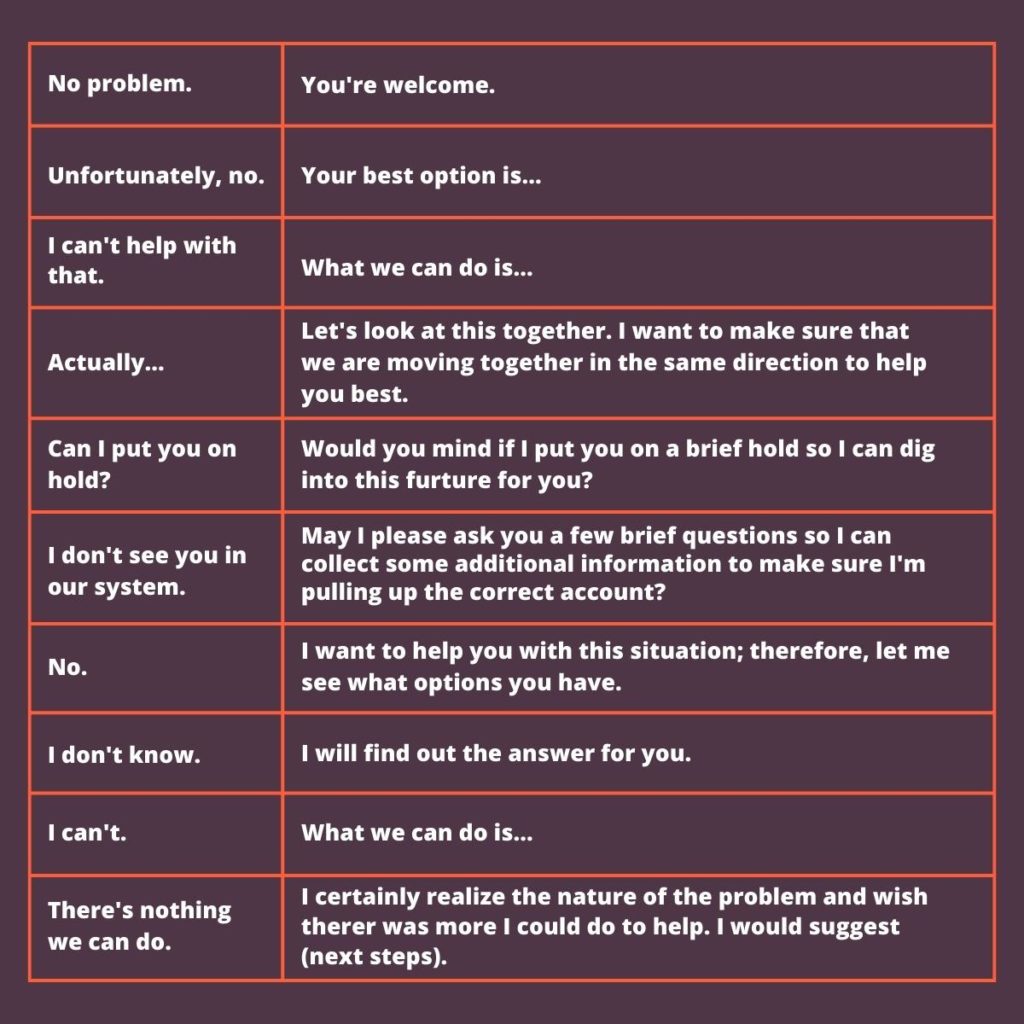In customer service and beyond, words matter. Did you know studies have found that negative words can increase Implicit Processing within the brain’s subgenual anterior cingulate cortex? Put simply, whether spoken, heard, or thought—negative comments release stress and anxiety-inducing hormones in our bodies.
The last thing we want to do in a personal or professional conversation is cause situational stress by simply uttering a phrase that contains a double negative like, “no worries.” That’s why at Bonfire Training, we’re here to offer you more intentional ways to deliver the same message.
Let’s talk about how certain phrases can turn people off (consciously or subconsciously) and what you can say instead. Keep reading!
The Problem With No Problem
In customer service (and life in general), positivity consistently facilitates smoother transitions, clearer communication, and more satisfied customers. Even if a front-line representative is doing everything else to the best of their ability, some thoughtless phrases may be the final straw for a frustrated customer.
Despite their intended meaning, verbiage like “no problem” and “no worries” are negative in construction. While this is common and acceptable jargon for more casual conversation, it’s important to remember that hearing these double negatives can actually trick our brains into a negativity bias! Even though “no problem” is synonymous with phrases like “happy to help” and “of course,” the mind latches on to the negative words “no” and “problem.” This can make us subconsciously believe there was a problem in the first place—even if there wasn’t. Our brain’s interpretation of the interaction went from positive to negative with a single phrase.
Additionally, if someone expresses gratitude and you respond with, “no worries,” it can come off like you’re deflecting someone’s acknowledgment. This isn’t the best way to build relationships and promote customer retention! With 93% of customers saying they’re likely to make repeat purchases with companies that offer excellent customer service, intentional communication strategies are a must.
What to Say Instead
If someone’s ever told you to “choose your words wisely,” it’s likely because the situation required words with an air of thoughtfulness and sensitivity. In general, customers are reaching out to customer support because they need help with something. They may already feel frustrated, inconvenienced, hopeless, or all three! Subliminal negative language like “no problem” or “no worries” could make a customer feel like THEY are the problem or worry.
Even seemingly innocent phrases like “I’m not going to lie,” “truthfully,” or “honestly” can send the wrong message. This language might make someone think, “as opposed to all the other times that you do lie/are not truthful or honest?” That’s definitely not what you want your customers to think!
It may take a bit of a mindset shift, but we challenge you to start thinking of alternative phrases you can use to convey a more positive message and outcome in your personal and professional life. Your brain and the brains of the people you interact with will thank you! Instead of muddling your conversations with negative phrasing, go straight to positive words like:
- My pleasure
- Happy to help
- Certainly
- This should be simple/quick
- Of course
- You’re welcome

Better Conversations & Better Care with Bonfire
Words are important, but the underlying relationship with your customers matters even more.
At Bonfire, we know customer service teams need up-to-date training and support to take on emerging trends and the influx of changes in the industry. We have a whole arsenal of resources to help your team genuinely connect and build strong relationships with those you serve.
To learn more about improving the overall conversation and customer satisfaction skills at your business, contact us!

